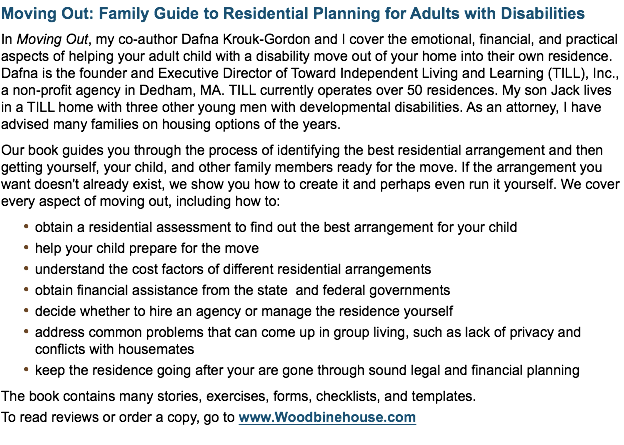
Books:



Legal Planning for Special Needs in Massachusettses
Legal Planning for Special Needs In Massachusetts, which I wrote for parents and professionals, has been completely revised and expanded for 2017. It covers three major areas: SSI, guardianship, and estate planning.
The SSI section walks you through the Supplemental Security Income program, from completing the application to managing the benefits. When your child applies, he or she can't have more than $2,000 in resources. You may have to reduce the amount of resources to qualify—I explain permissible ways to spend them, or how to put them in a special needs trusts.
If your child has intellectual disability (which we used to call mental retardation), you may have to apply for guardianship. I walk you through the steps, from the clinical evaluations you will need through the hearing and follow up reporting. The so-called Rogers guardianships and annual treatment plans are also covered in detail.
The estate planning section explains wills, special needs trust, and other legal documents you should have. I also explain the importance of naming the proper beneficiaries for your life insurance policies and retirement accounts.
To read reviews or to purchase, go to Amazon.com or DisAbilitiesBooks.com

Managing a Special Needs Trust: A Guide for Trustees
My colleagues and I wrote Managing a Special Needs Trust: A Guide for Trustees in order to de-mystify special needs trusts. As attorneys who practice in the disability field, we noticed that many trustees—although they were well intentioned—were not doing a very good job. Some trustees were reluctant to spend any money for fear of getting into trouble with the government. Others were using the trust funds in ways that needlessly reduced the beneficiary's public assistance. The benefits of the trust were being lost.
We believe that money in a special needs trust should be used and enjoyed. We wrote our book so that trustees—lay people as well as professionals—can do the best job possible. The book is not a legal tome (although many attorneys buy it as a reference book). It is written in plain English in order to be accessible to as many readers as possible. In an easy-to-follow format, we explain how trustees can:
- Understand the rules of major public benefit program that assist people with disabilities
- Pay for items the beneficiary needs without reducing public benefits
- Spend the money on things the beneficiary can use and enjoy, such as recreation, medical care, housing, clothes, and transportation
- Set up a budget, keep accurate records, and manage the trust bank account
- Invest the trust funds
- Hire caregivers
- Get help from accountants, case managers, social workers, and other professionals
To read reviews or purchase, go to Amazon.com at DisAbilitiesBooks.com
Moving Out: Family Guide to Residential Planning for Adults with Disabilities
Legal Planning for Special Needs in Massachusetts
Managing a Special Needs Trust: A Guide for Trustees
19 Muzzey St. Suite 207, Lexington, MA 02421
Copyright © 2017 Lexington, Massachusetts